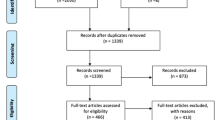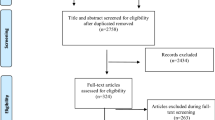Abstract
Background
There is a dearth of large, nationally representative studies that examine racial/ethnic disparities in self-reported unmet need for mental health care among children and youth.
Objective
This study assessed racial/ethnic disparities in unmet need for mental health care, use of psychotropic medication, and reasons for forgone care among children and youth.
Methods
This nationally representative cross-sectional study analyzed data from the combined 2016–2020 National Survey of Children’s Health (n = 151,876). Bivariate statistics and multivariable logistic regression models assessed the association between race/ethnicity, unmet need for mental health care, and use of psychotropic medication. Reasons for forgone care were also examined.
Results
Black non-Hispanic children and youth had approximately twice the odds of unmet mental health care needs (AOR, 1.97; 95% CI 1.53–2.55) as White non-Hispanic children and youth. The likelihood of reporting that it was not possible to see a mental health professional was higher for Black non-Hispanic (AOR, 3.39; 95% CI 1.64–7.01) and Multi-racial/Other non-Hispanic children and youth (AOR, 2.96; 95% CI 1.40–6.25) compared with White non-Hispanic peers. Black non-Hispanic, Hispanic, and Multi-racial/Other non-Hispanic children and youth were also less likely to use psychotropic medication (p < 0.001). Common reasons for forgoing care included cost, problems getting an appointment, and lack of transportation or childcare.
Conclusions
This study found significant racial/ethnic disparities in unmet mental health care, psychotropic medication use, and barriers in accessing mental health care. Data from this study suggest that eliminating these disparities requires policy interventions that address medical and societal barriers to health care access and quality.
Similar content being viewed by others
Data Availability
Data is publicly available and can be accessed from https://www.childhealthdata.org/learn-about-the-nsch/NSCH.
Code Availability
Not applicable.
References
Bitsko RH, Claussen AH, Lichstein J, et al. Mental Health Surveillance Among Children - United States, 2013–2019. MMWR Suppl. 2022;71:1–42.
Perou R, Bitsko RH, Blumberg SJ, et al. Mental health surveillance among children–United States, 2005–2011. MMWR Suppl. 2013;62:1–35.
Whitney DG, Peterson MD. US national and state-level prevalence of mental health disorders and disparities of mental health care use in children. JAMA Pediatr. 2019;173:389–91.
Doupnik SK, Rodean J, Feinstein J, et al. Health Care Utilization and Spending for Children With Mental Health Conditions in Medicaid. Acad Pediatr. 2020;20:678–86.
Curtin SC, Heron M. Death Rates Due to Suicide and Homicide Among Persons Aged 10–24: United States, 2000–2017. NCHS Data Brief. 2019;352:1–8.
Bitsko RH, Holbrook JR, Ghandour RM, et al. Epidemiology and Impact of Health Care Provider-Diagnosed Anxiety and Depression Among US Children. J Dev Behav Pediatr. 2018;39:395–403.
Centers for Disease Control and Prevention. Youth Risk Behavior Survey: data summary & trends report 2011–2021. Atlanta, GA: US Department of Health and Human Services, CDC; 2023.
Lu W. Adolescent Depression: National Trends, Risk Factors, and Healthcare Disparities. Am J Health Behav. 2019;43:181–94.
Substance Abuse and Mental Health Services Administration. (2020). Key substance use and mental health indicators in the United States: Results from the 2019 National Survey on Drug Use and Health (HHS Publication No. PEP20-07-01-001, NSDUH Series H-55). Rockville, MD: Center for Behavioral Health Statistics and Quality, Substance Abuse and Mental Health Services Administration. Retrieved from https://www.samhsa.gov/data/
Benton TD, Boyd RC, Njoroge WFM. Addressing the Global Crisis of Child and Adolescent Mental Health. JAMA Pediatr. 2021;175:1108–10.
Alegría M, Green JG, McLaughlin KA, Loder S. Disparities in child and adolescent mental health and mental health services in the US. New York, NY: William T. Grant Foundation; 2015. p. 26.
Rodgers CRR, Flores MW, Bassey O, et al. Racial/Ethnic Disparity Trends in Children’s Mental Health Care Access and Expenditures From 2010–2017: Disparities Remain Despite Swee** Policy Reform. J Am Acad Child Adolesc Psychiatry. 2022;61:915–25.
Marrast L, Himmelstein DU, Woolhandler S. Racial and Ethnic Disparities in Mental Health Care for Children and Young Adults: A National Study. Int J Health Serv. 2016;46:810–24.
Costello EJ, He JP, Sampson NA, et al. Services for Adolescents With Psychiatric Disorders: 12-Month Data From the National Comorbidity Survey-Adolescent. Psychiatr Serv. 2014;65:359–66.
Cummings JR, Ji X, Lally C, Druss BG. Racial and Ethnic Differences in Minimally Adequate Depression Care Among Medicaid-Enrolled Youth. J Am Acad Child Adolesc Psychiatry. 2019;58:128–38.
Cook BL, Barry CL, Busch SH. Racial/Ethnic Disparity Trends in Children’s Mental Health Care Access and Expenditures from 2002 to 2007. Health Serv Res. 2013;48:129–49.
Zablotsky, B., & Terlizzi, E. P. (2020). Mental Health Treatment among Children Aged 5-17 Years: United States, 2019. NCHS Data Brief. No. 381. National Center for Health Statistics.
Huang KY, Calzada E, Cheng S, Brotman LM. Physical and mental health disparities among young children of Asian immigrants. J Pediatr. 2012;160:331-336.e331.
Centers for Disease Control and Prevention. Unmet Need. Available at: https://www.cdc.gov/nchs/hus/sources-definitions/unmet-need.htm. Accessed March 2023.
Carr W, Wolfe S. Unmet needs as sociomedical indicators. Int J Health Serv. 1976;6:417–30.
Andersen R. Health status indices and access to medical care. Am J Public Health. 1978;68:458–63.
Goldstein AB, Oudekerk BA, Blanco C. From Prevention Science to Services: Identifying Paths to Sustainable Evidence-Based Preventive Interventions. Psychiatr Serv. 2023;74:564–5.
United States Census Bureau. National Survey of Children’s Health (NSCH). Available at: https://www.census.gov/programs-surveys/nsch/data.html. Accessed March 2023.
Data Resource Center for Child and Adolescent Health. NSCH Survey Methodology. Available at: https://www.childhealthdata.org/learn-about-the-nsch/methods. Accessed March 2023.
Casseus M, Cheng J. Children with Cerebral Palsy and Unmet Need for Care Coordination. J Dev Behav Pediatr. 2021;42:605–12.
Shim R, Szilagyi M, Perrin JM. Epidemic Rates of Child and Adolescent Mental Health Disorders Require an Urgent Response. Pediatrics. 2022;149(5). https://doi.org/10.1542/peds.2022-056611
Benevides TW, Carretta HJ, Mandell DS. Differences in Perceived Need for Medical, Therapeutic, and Family Support Services Among Children With ASD. Pediatrics. 2016;137:S176.
Cook BL, Hou SS-Y, Lee-Tauler SY, et al. A Review of Mental Health and Mental Health Care Disparities Research: 2011–2014. Med Care Res Rev. 2019;76:683–710.
Casseus M, Kim WJ, Horton DB. Prevalence and treatment of mental, behavioral, and developmental disorders in children with co-occurring autism spectrum disorder and attention-deficit/hyperactivity disorder: A population-based study. Autism Res. 2023;16:855–67.
Walkup J. Practice parameter on the use of psychotropic medication in children and adolescents. J Am Acad Child Adolesc Psychiatry. 2009;48:961–73.
Walter HJ, Abright AR, Bukstein OG, et al. Clinical Practice Guideline for the Assessment and Treatment of Children and Adolescents With Major and Persistent Depressive Disorders. J Am Acad Child Adolesc Psychiatry. 2023;62:479–502.
Walter HJ, Bukstein OG, Abright AR, et al. Clinical Practice Guideline for the Assessment and Treatment of Children and Adolescents With Anxiety Disorders. J Am Acad Child Adolesc Psychiatry. 2020;59:1107–24.
Lu W, Bessaha M, Muñoz-Laboy M. Examination of Young US Adults’ Reasons for Not Seeking Mental Health Care for Depression, 2011–2019. JAMA Netw Open. 2022;5:e2211393–e2211393.
Mason MJ, Keyser-Marcus L, Snipes D, et al. Perceived Mental Health Treatment Need and Substance Use Correlates Among Young Adults. Psychiatr Serv. 2013;64:871–7.
Kalb LG, Stapp EK, Ballard ED, Holingue C, Keefer A, Riley A. Trends in Psychiatric Emergency Department Visits Among Youth and Young Adults in the US. Pediatrics. 2019;143(4). https://doi.org/10.1542/peds.2018-2192
Alvarez K, Cervantes PE, Nelson KL, Seag DEM, Horwitz SM, Hoagwood KE. Review: Structural Racism, Children's Mental Health Service Systems, and Recommendations for Policy and Practice Change. J Am Acad Child Adolesc Psychiatry. 2022;61(9):1087-1105. https://doi.org/10.1016/j.jaac.2021.12.006
Dieleman JL, Cao J, Chapin A, et al. US Health Care Spending by Payer and Health Condition, 1996–2016. JAMA. 2020;323:863–84.
Health Resources and Services Administration. Integrating behavioral health and primary care for children and youth. Available at: https://www.integration.samhsa.gov/integrated-care-models/Overview_CIHS_Integrated_Care_Systems_for_Children.pdf. Accessed Sept 2023.
Tyler ET, Hulkower RL, Kaminski JW. Behavioral health integration in pediatric primary care. Milbank Memorial Fund. 2017;15:1–24.
Asarnow JR, Rozenman M, Wiblin J, Zeltzer L. Integrated Medical-Behavioral Care Compared With Usual Primary Care for Child and Adolescent Behavioral Health: A Meta-analysis. JAMA Pediatr. 2015;169:929–37.
So M, McCord RF, Kaminski JW. Policy Levers to Promote Access to and Utilization of Children’s Mental Health Services: A Systematic Review. Adm Policy Ment Health. 2019;46:334–51.
Centers for Disease Control and Prevention. Improving Access to Children’s Mental Health Care. Available at: https://www.cdc.gov/childrensmentalhealth/access.html. Accessed Sept 2023.
Funding
This work was supported by the U.S. Department of Health and Human Services Health Resources and Services Administration (award numbers U3DMC32755-01-00 and T32HP42017‐02‐00). The contents are those of the author and do not necessarily represent the official views of, nor an endorsement, by HRSA, HHS or the US Government.
Author information
Authors and Affiliations
Contributions
The author was responsible for all aspects of the manuscript.
Corresponding author
Ethics declarations
Ethics Approval
Ethic approval was not required as this study used data from a public-use dataset.
Consent to Participate
Not applicable.
Consent for Publication
Not applicable.
Conflicts of Interest
There are no relevant financial or non-financial interests to disclose.
Additional information
Publisher's Note
Springer Nature remains neutral with regard to jurisdictional claims in published maps and institutional affiliations.
Supplementary Information
Below is the link to the electronic supplementary material.
Rights and permissions
Springer Nature or its licensor (e.g. a society or other partner) holds exclusive rights to this article under a publishing agreement with the author(s) or other rightsholder(s); author self-archiving of the accepted manuscript version of this article is solely governed by the terms of such publishing agreement and applicable law.
About this article
Cite this article
Casseus, M. Racial and ethnic disparities in unmet need for mental health care among children: A nationally representative study. J. Racial and Ethnic Health Disparities (2023). https://doi.org/10.1007/s40615-023-01801-4
Received:
Revised:
Accepted:
Published:
DOI: https://doi.org/10.1007/s40615-023-01801-4




